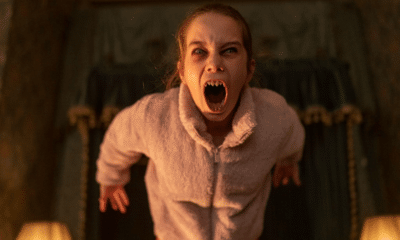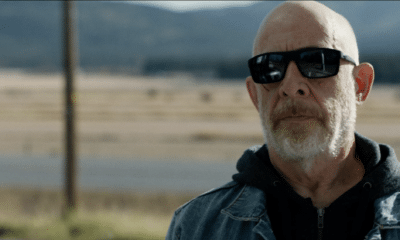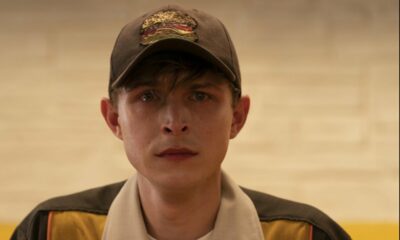
Chris Collier interview for Frightfest: Beneath the Dark Heart of Cinema
This year’s Arrow Video Frightfest was slightly different to normal as the festival itself was thrust into the spotlight in documentary – Frightfest: Beneath the Dark Heart of Cinema. The film saw organisers Alan Jones, Greg Day, Ian Rattray and Paul McEvoy take centre stage alongside devoted festival attendees known as Frightfesters. Directed by Chris Collier, who works behind the scenes at the film festival, the film is a love letter to the yearly event that celebrates the best of the darker side of cinema.
We managed to catch a few minutes with Chris in between his very hectic schedule to get an insight into the making of documentary.
So is Frightfest something that you’ve always come to?
No, the first one I came to was in 2009, which was the first one at the Empire, and is kind of why the film has an inner-arc about the Empire, just because of how I feel about that cinema. I came because, at the time, I did a podcast with someone else and we went to press screenings and things, and he’d been to Frightfest since the beginning. I always thought it was strange to just go and watch horror films in that volume for that amount of time. He introduced me to Ian [Rattray] at a screening of something, and Ian said, ‘if you can’t make you mind-up about something like that, you should really come to it first, before you can say anything about it.’ So between them they persuaded me to go. I came in 2009 and that was that really, I’ve been here ever since (laughs).
What was it that made you decide it would be a good topic for a film?
Well I started working with them in 2011; the last film I saw in full in Frightfest was in 2011. I’ve not seen a film in full since, yet I’ve been here every single day. I started working with them and organising their video coverage, and that means going to a meeting with them every morning, at like nine in the morning. You can probably imagine that, over the years, and certainly through some of the years where things were perhaps weren’t as well organised, some of those meetings were quite interesting.
So I got to know them really well, and I thought there was something there in that quite a lot of the Frightfesters don’t know, how hard it is for them to put it together. There had been someone else who had tried to make a documentary in 2012, but they were involved in it. My view was that would never work. Hence when I spoke to them, I said there’s no way you can be involved in it in anyway.
It was a bit of an accident really that I can to it. We were making a music documentary and then, for various reasons, halfway through that we couldn’t finish it. We’d shot a lot of footage, spent money, and then the next day we didn’t have a film anymore. Which is rather unpleasant. Suddenly you thought you were making a film, and you’re not. You know on You Tube, how you get those recommend videos? I was some. I’m into music in a big way and I was watching some music production videos. Being the age, I got drawn into these Nirvana videos and ended-up watching this punk documentary, and Alan was in it. I just started thinking about the guys, about Alan, about the other things they had done. There is more to these guys than just Frightfest. Then I went for a meeting with Ian about Frightfest going to Sheppard’s Bush, and we spoke for about five minutes and then we started talking about other stuff. He programmes films for cinemas and we started talking about that, and then we were talking about Moving Picture show which he started when he was younger. Then off the cuff I said, ‘if you were going to make a documentary at Frightfest, I’d do it like this’. He said, ‘why don’t you tell the others?’ Then I drove back and phoned my production partner, and said, ‘I think we’re making a film about Frightfest’

Chris Collier interview for Frightfest: Beneath the Dark Heart of Cinema. Photo Credit: Julie Edwards
How did you get the fans involved, were they people that you already knew from the festival?
There were some that I knew and thought would be ideal, like the son and his father who I knew already, and I thought they’ve got to be in it. Then I spoke to other people and the production manager on the film has been coming since the first year, so knows loads of people. We got this list, this really long list together, and gradually worked our way through it. Spoke to a few people. Some of the people who are in it, it was literally when I went to interview them that was the first time I’d ever spoken to them. We could have been at the same festival for years. I guess being more behind the scenes I don’t meet as many people. I guess I chose them in the end, but not in the beginning.
There’s another documentary screening, Cult of Terror, which also looks at the horror fandom. That one features interviews with the likes of Robert Englund and Barbara Crampton. Did that idea ever enter your head, that you might approach really famous genre stars, or was it always going to be about the organisers and the fans?
There was some archive footage that we’d used, but it had to feel like – the bit we used of Gareth Edwards was because obviously he’s Gareth Edwards, but you could clearly see and hear in his voice that it was like his dream come true – that’s what I wanted to get. Eli Roth saying why he wanted his film to play there. Now, if I interviewed Eli Roth now, it would just be an interview with Eli Roth. Whereas the people we did interview for it Dominic Brunt, Adam [Green] and Joe [Lynch] and someone like Jake – Jake West – is in as a Frightfester. Those were the kind of people that we wanted.

Chris Collier interview for Frightfest: Beneath the Dark Heart of Cinema. Photo Credit: Julie Edwards
Was there anyone who was particularly hard to wrangle in the interviews? I know that both Adam and Joe for example, are bundles of hyperactivity…
You’ll notice in the film that Joe has got a very, very croaky voice. It was shot after the karaoke last year. He was just about to fly out. I don’t know if he was late for it or what, but we chatted for ages and ages. They were fine and they knew what it was I was trying to say, and they really just said exactly what I’d hoped.
The Frightfest guys, I knew what to ask them because I had seen…you know the bit about the more difficult time, I’d been there and seen it. It was just a case of reminding them because I think they blanked a lot of it out.
What were your thoughts on the Shepard’s Bush year?
The cinema was great. They had all those extra screens and they could screen all that extra stuff, and we had a whole screen to ourselves where we could shoot interviews. But, it’s not the Empire or the Prince Charles. We actually started properly shooting the film on the first day of Shepard’s Bush. Everything else is just archive we’d shot before. We shot a lot more stuff at Shepard’s Bush that’s not in the film.
Then gradually, as we shot over the coming… it was – I knew it was going to be at the Empire a lot earlier than people I was talking to – that’s why there was the question about where would you really want it to be? In almost all cases they said they’d like it to be at the Empire, which was very fortunate. But it still wasn’t confirmed and we were thinking, ‘if we don’t go back to the Empire now, our film’s really going to have a lame ending’. It’s kinda of nice that it came full circle and is back at the Empire and the Prince Charles where it all started. It was really great to have the film play there when there’s some really, really early footage shot on someone’s phone of Guillermo del Toro on stage there. I’m thinking our film is playing the same place.
Are documentaries something that you’d like to continue to pursue?
Yeah. We’re starting to make another music documentary. Like with any of these things, there’s like fifty things that you need to get in place, but we’ll probably get six in place and then go for it. With a documentary it’s a bit easier to do that.
Frightfest: Beneath the Dark Heart of Cinema screened at 2018’s Arrow Video Frightfest, read our review here.
Kat Hughes is a UK born film critic and interviewer who has a passion for horror films. An editor for THN, Kat is also a Rotten Tomatoes Approved Critic. She has bylines with Ghouls Magazine, Arrow Video, Film Stories, Certified Forgotten and FILMHOUNDS and has had essays published in home entertainment releases by Vinegar Syndrome and Second Sight. When not writing about horror, Kat hosts micro podcast Movies with Mummy along with her five-year-old daughter.

Latest Posts
-


Film News
/ 9 hours agoFirst ‘Transformers One’ teaser trailer debuts IN SPACE!
The animated feature film is heading to cinemas this September.
By Paul Heath -


Film Reviews
/ 10 hours ago‘Abigail’ review: Dirs. Matt Bettinelli-Olpin & Tyler Gillett (2024)
Matt Bettinelli-Olpin and Tyler Gillett direct this new horror/ heist hybrid.
By Awais Irfan -


Film Trailers
/ 11 hours agoNew trailer for J.K. Simmons-led ‘You Can’t Run Forever’
A trailer has dropped for You Can’t Run Forever, a new thriller led by...
By Paul Heath -


Film Trailers
/ 16 hours agoNew trailer for Shudder’s ‘Nightwatch: Demons Are Forever’
Coming to Shudder this May.
By Paul Heath















